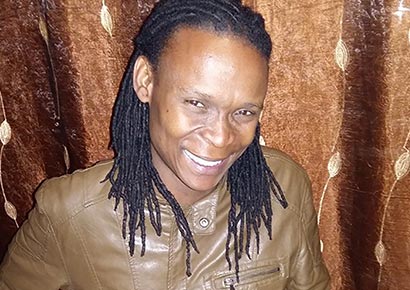LGBTIQ hate crimes | Two unresolved cases in Potchefstroom

Bobby Motlatla
Silke Spierings accompanies activists to Potchefstroom, where two victims of LGBTIQ hate crimes, one alive and one dead, are still awaiting justice.
“Why did you decide to report the rape to the police, Mbali*?” Dawie asks carefully. ‘”I don’t want to keep silent. I want to make a difference, for other victims. I want something to be done,” she says.
We are sitting in the living room of Mbali’s family. Their house is one of the better looking ones in the Potchefstroom township.
On the soccer field, some six hundred meters away, the rape took place. One year and three months ago.
The pain is still alive today. We can hear it in Mbali’s trembling voice. We notice it in her body language and see it in her father’s eyes. It may become less in the years to come. But not now.
Mbali is 18-years-old and is still in grade 10. She finds it hard to focus at school. When she’s alone, the images of the rape come to her. The perpetrator used a lot of violence and she was severely injured.
OUT and other LGBTIQ organisations in South Africa that work together with the Department of Justice in a task team suspect her sexual orientation was a motive for the rape.
This rape is one of the focus cases for OUT, an NGO that offers various services to LGBTIQ people. Among their activities, through their Love Not Hate programme, is to follow up on hate crimes perpetrated against LGBTIQ people and to ensure the police treats them adequately.
Director Dawie Nel and programme manager Lerato Phalakatshela have invited the Netherlands Embassy on this trip to show their work and to strengthen their delegation to the police station.
We head to the Potchefstroom police station, where we meet gay rights activist Thabiso Mogapi wa Tsotetsi (Action for Social Justice International). Thabiso shares his insights into the LGBTIQ communities with the police, which can assist in solving cases.
There are two cases he is currently involved with in Potchefstroom. The man who raped Mbali is identified, but not arrested. The detectives however suspect that he is still in Potchefstroom, in the same township where Mbali lives.
His picture has been published in the local newspaper several times. With no result. Community members are protecting him, the policeman says. “Informants are less eager to talk lately. The small money that we offer does not weigh up to the repercussions they fear. The police pays them too late and sometimes not at all.”
The two officers try to speak to as many community members as possible, as frequently as possible; looking for possible eye witnesses and new information. They share a police vehicle, which limits the number of visits they can make.
The other case concerns the murder of Bobby Motlatla (in November 2015). The police officer explains: “He was a beloved, well known music student at the North West University. And he was gay. He was brutally murdered for that reason.” She shivers: “We found him four days later in his home, lying on his back on the bed. His body was stabbed 39 times and covered in sperm.”
Bobby’s case is stuck, the investigator admits. Normally she would close the docket, but this case is important to her. She does not want to let it go.
On the night of his murder, Bobby was in Mr. Chips, as the location history of his phone shows. “It is a dodgy bar, where fights occur almost every weekend. On the security camera’s video of that night we have been able to recognise Bobby by his long rasta hair. The others in the bar are unrecognisable, because the video quality is bad. The two men with whom he left as well.”
There were no signs that force was used to enter his house. The two men are suspects, but little else is known about them. Does the officer know that Mr. Chips is a typical pick up place, where gay men, transgender individuals and sex workers meet? Thabiso asks. She is very surprised. Although she visits Mr. Chips regularly for the investigation, she has never noticed this.
She does not judge. There is no place for stigmatisation of the victims in this conversation. Both investigators do everything in their power to solve the cases, including having open conversations with Thabiso.
All Bobby’s phone calls in the last two months have been traced, his Facebook messages have been looked into. I wonder if Bobby might have been on Grindr, an app where gay men meet. Grindr and other social media, like Instagram and Snapchat, might provide new information.
They will let Thabiso know when they go to court, the police woman promises when we leave. His expertise is welcome. Any development in the cases will be shared.
The detectives are hopeful. The government has recently put a new national DNA matching system in place. Offenders of serious violent crime must submit a DNA sample as well as their fingerprints. All DNA is stored in a central national databank.
“Guys who stab another person 39 times will commit a crime again. At that moment, we will match their DNA to the DNA we found in the sperm on Bobby’s body. There will be justice.”
* Mbali is not the real name of the victim. Silke Spierings is an intern with the Netherlands Embassy in Pretoria.
Leave a Reply